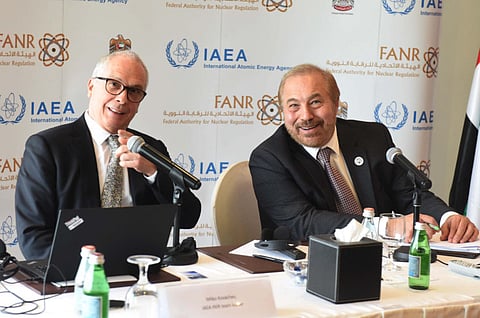Nuclear watchdog gives UAE top marks in review
Country clears milestone 3 of IAEA’s benchmarks with regard to nuclear infrastructure

Abu Dhabi: Experts from the International Atomic Energy Agency (IAEA) have carried out a comprehensive review of the UAE’s nuclear infrastructure, with their report highlighting the country’s continued progress in its commitment to providing a safe and reliable nuclear energy programme.
The review mission by the IAEA took place from June 24 to July 1 at the behest of the UAE as part of its Integrated Nuclear Infrastructure Review (INIR), with its official report handed over to the Federal Authority for Nuclear Regulation (FANR) on Sunday. The INIR missions are separated into three milestone benchmarks, with each milestone reviewing various aspects of a country’s nuclear infrastructure such as its readiness to launch a nuclear programme and its readiness to start constructing its nuclear power plant. With both milestones completed by the UAE, the third milestone reviews the readiness of operating the nuclear energy plant.
As part of its review for milestone three, the IAEA team examined 19 infrastructure- related requirements including emergency planning and preparedness, human resource development, nuclear safety and radiation protection, physical and cyber security, and environmental protection. The UAE was found to have achieved milestone three after the completion of the IAEA’s thorough review.
“The UAE is rapidly moving forward with the development of its peaceful nuclear energy sector. The successful conclusion of the phase three INIR mission is a testament to the UAE’s commitment to upholding the highest international standards of safety, security, and transparency as we approach the commissioning of the nation’s first nuclear energy plant,” said ambassador Hamad Al Ka’abi, UAE’s Permanent Representative at the IAEA.
“The extraordinary progress of the UAE’s peaceful nuclear energy programme is a result of our continuous collaboration with an extensive network of international organisations whose members include some of the world’s most renowned professionals in nuclear energy. Our close relationship with the IAEA, as well as our cooperation with international nuclear energy organisations and regulators has allowed us to rise to the forefront of the peaceful nuclear energy industry,” he added.
Milko Kovachev, the head of the IAEA’s Nuclear Infrastructure Development Section, said their report had provided a list of 7 good practices they found while carrying out their review as well as 10 recommendations to follow up on.
“The UAE has made steady progress since the mission in 2011, which has been emphasised by the fact that the IAEA team has identified seven high quality practices in relation to the 19 elements analysed.
“The review team has developed some recommendations which, if implemented, could further enhance the nuclear infrastructure in the country and support the development of a safe, transparent, reliable and peaceful nuclear energy programme,” he added.
Kovachev said good practices included FANR’s request to develop an operational readiness report and Nawah Energy Company’s continuous self-assessment along with their strong engineering team.
Safety-first policy
Meanwhile, Raoul Awad, FANR’s deputy director general – Operations, said he was confident that the Unit 1 reactor would become operational in late 2019.
“We are confident about the time schedule, we don’t have any reason to doubt the timeline particularly after a full assessment was done by Nawah and Emirates Nuclear Energy Cooperation.
“One of the principles of the UAE nuclear energy programme is we do not prioritise [time] schedules over the quality, readiness and the safety [of the nuclear power plant]. Whenever it’s ready [and has met all the safety regulations], we will issue the licence,” he added.
Sign up for the Daily Briefing
Get the latest news and updates straight to your inbox



